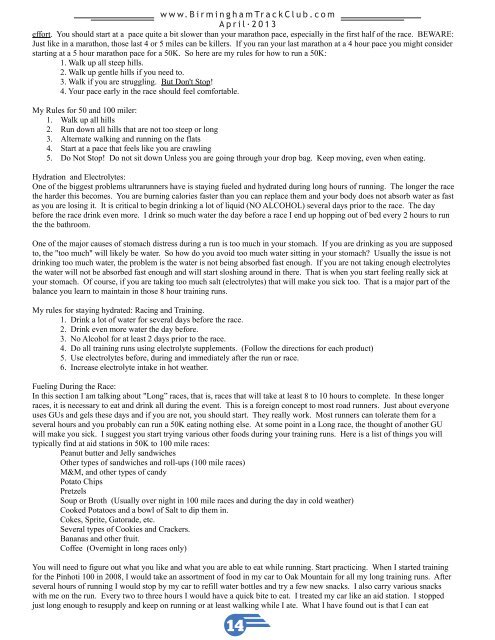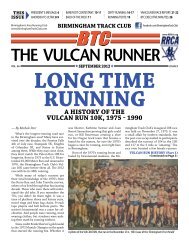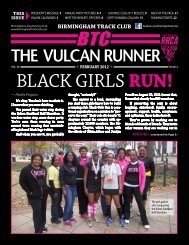April - Birmingham Track Club
April - Birmingham Track Club
April - Birmingham Track Club
Create successful ePaper yourself
Turn your PDF publications into a flip-book with our unique Google optimized e-Paper software.
www.<strong>Birmingham</strong><strong>Track</strong><strong>Club</strong>.com<br />
<strong>April</strong>∙2013<br />
effort. You should start at a pace quite a bit slower than your marathon pace, especially in the first half of the race. BEWARE:<br />
Just like in a marathon, those last 4 or 5 miles can be killers. If you ran your last marathon at a 4 hour pace you might consider<br />
starting at a 5 hour marathon pace for a 50K. So here are my rules for how to run a 50K:<br />
1. Walk up all steep hills.<br />
2. Walk up gentle hills if you need to.<br />
3. Walk if you are struggling. But Don't Stop!<br />
4. Your pace early in the race should feel comfortable.<br />
My Rules for 50 and 100 miler:<br />
1. Walk up all hills<br />
2. Run down all hills that are not too steep or long<br />
3. Alternate walking and running on the flats<br />
4. Start at a pace that feels like you are crawling<br />
5. Do Not Stop! Do not sit down Unless you are going through your drop bag. Keep moving, even when eating.<br />
Hydration and Electrolytes:<br />
One of the biggest problems ultrarunners have is staying fueled and hydrated during long hours of running. The longer the race<br />
the harder this becomes. You are burning calories faster than you can replace them and your body does not absorb water as fast<br />
as you are losing it. It is critical to begin drinking a lot of liquid (NO ALCOHOL) several days prior to the race. The day<br />
before the race drink even more. I drink so much water the day before a race I end up hopping out of bed every 2 hours to run<br />
the the bathroom.<br />
One of the major causes of stomach distress during a run is too much in your stomach. If you are drinking as you are supposed<br />
to, the "too much" will likely be water. So how do you avoid too much water sitting in your stomach? Usually the issue is not<br />
drinking too much water, the problem is the water is not being absorbed fast enough. If you are not taking enough electrolytes<br />
the water will not be absorbed fast enough and will start sloshing around in there. That is when you start feeling really sick at<br />
your stomach. Of course, if you are taking too much salt (electrolytes) that will make you sick too. That is a major part of the<br />
balance you learn to maintain in those 8 hour training runs.<br />
My rules for staying hydrated: Racing and Training.<br />
1. Drink a lot of water for several days before the race.<br />
2. Drink even more water the day before.<br />
3. No Alcohol for at least 2 days prior to the race.<br />
4. Do all training runs using electrolyte supplements. (Follow the directions for each product)<br />
5. Use electrolytes before, during and immediately after the run or race.<br />
6. Increase electrolyte intake in hot weather.<br />
Fueling During the Race:<br />
In this section I am talking about "Long” races, that is, races that will take at least 8 to 10 hours to complete. In these longer<br />
races, it is necessary to eat and drink all during the event. This is a foreign concept to most road runners. Just about everyone<br />
uses GUs and gels these days and if you are not, you should start. They really work. Most runners can tolerate them for a<br />
several hours and you probably can run a 50K eating nothing else. At some point in a Long race, the thought of another GU<br />
will make you sick. I suggest you start trying various other foods during your training runs. Here is a list of things you will<br />
typically find at aid stations in 50K to 100 mile races:<br />
Peanut butter and Jelly sandwiches<br />
Other types of sandwiches and roll-ups (100 mile races)<br />
M&M, and other types of candy<br />
Potato Chips<br />
Pretzels<br />
Soup or Broth (Usually over night in 100 mile races and during the day in cold weather)<br />
Cooked Potatoes and a bowl of Salt to dip them in.<br />
Cokes, Sprite, Gatorade, etc.<br />
Several types of Cookies and Crackers.<br />
Bananas and other fruit.<br />
Coffee (Overnight in long races only)<br />
You will need to figure out what you like and what you are able to eat while running. Start practicing. When I started training<br />
for the Pinhoti 100 in 2008, I would take an assortment of food in my car to Oak Mountain for all my long training runs. After<br />
several hours of running I would stop by my car to refill water bottles and try a few new snacks. I also carry various snacks<br />
with me on the run. Every two to three hours I would have a quick bite to eat. I treated my car like an aid station. I stopped<br />
just long enough to resupply and keep on running or at least walking while I ate. What I have found out is that I can eat<br />
14







